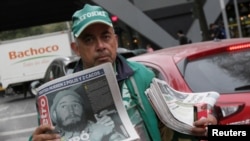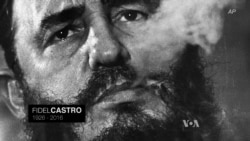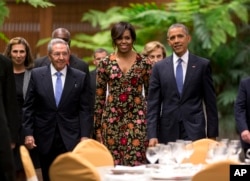In life and death, Fidel Castro split Cubans - those who remained on the island, by choice or lack thereof, and those who left, by rickety raft or plane. Likewise, U.S. policy divided the community on both sides of the Florida Straits. Now the U.S., which in recent years revived diplomatic relations with Cuba, is on the cusp of an administration change that could once again alter the relationship.
"His legacy is definitely going to be complicated and divisive," says Sarah Kinosian, a researcher on Cuba at the Washington Office on Latin America. "He was a polarizing figure, but a powerful one."
In Miami, the geographic heart of Cuban exile and anti-Castro sentiment, there was joy at his death and the seeming end of an era as Cuban-Americans turned out in the pre-dawn streets of Little Havana; in the Cuban capital, as ever, reaction split along party lines: those who opposed Castro leadership, and those who mourned the iconic leader's death.
Under the headline in Spanish, "Until victory, always!" state media reported that Castro died November 25, at 10:29 p.m.
"He's not here... he's gone. We survived Fidel Castro," wrote blogger Yoani Sanchez, who for years has been one of the most visible, outspoken anti-Castro voices in Cuba.
In a poetic ode to the leader Saturday morning, pro-Castro writer Yenima Díaz Velázquez posted on her blog: "The world is crying over you, though a few people are laughing. They think that without you, it will all end. As if death extinguished an entire life's work. But, what death am I talking about, if you live on?"
Fidel Castro is internationally recognized, both revered and loathed. His death has been falsely reported so many times since the 1960s that one Cuban blogger said she received calls early Saturday checking to see if the news was really true this time.
"Fidel Castro is dead," writes Reinaldo Escobar, a journalist in Havana with one of the non-governmental news websites in the country. "To the sadness of some, and the delight of others, this time it's true."
Future of Cuba-US Relations
For years, in falling health, Castro waned from public view, handing over daily leadership to his brother Raul and ushering in an era of rapprochement between Washington and Havana, the likes of which hadn't been seen in decades of Castro rule that outlasted 11 U.S. presidents. President Barack Obama became the first U.S. leader to visit the island since the Castro revolution and restored diplomatic relations between the U.S. and Cuba.
"I don't think you're going to see some massive change overnight," Kinosian says of Cuba after Fidel Castro's death. "His legacy is definitely going to be weighed with these different visions of him... Raul is still in power until 2018. I think the question now is whether Fidel's death will weaken hardliners resisting reform."
Likewise, Brian Fonseca, Director of the Institute of Public Policy at Florida International University’s School of International and Public Affairs, doesn't believe there will be immediate political changes for Cuba, "but it’s certainly going to cast off this shadow that Fidel has had over the island for so many years and perhaps create the space that would allow for change going forward."
As Havana residents prepared for Obama's visit last March, they were uncertain about what they wanted from renewed diplomatic relations. And end to the economic embargo, for the most part - but they remain under Castro family leadership, regardless of U.S. policy. Hardline anti-Castro protesters were unconvinced then that the rapprochement was a good idea, and that it would bring change to the island.
"Cuba has already its transition and its transition will largely be headed by Raul until February 2018," explains Florida International University politics professor Eduardo Gamarra. "They have in place a transition mechanism as well beyond 2018, so I don’t think there is going to be any change in what Cuba is doing, but I do think there will be a change in what Washington will be doing.”
But what "change" will mean under U.S. President-elect Donald Trump remains unclear, and won't be solidified until at least Jan. 20, when he takes office. Last year, Trump claimed to support thawing relations with Havana, saying "I think it's fine, but we should have made a better deal," Trump added. "The concept of opening with Cuba is fine."
While campaigning in Florida in September, Trump switched gears, saying he would reverse Obama's policies on Cuba "unless the Castro Regime meets our demands. Those demands will include religious and political freedom for the Cuban people."
On Saturday, he issued a statement that echoes the rhetoric of hardline anti-Castro members of Congress, calling Fidel Castro a "brutal dictator" and Cuba a "totalitarian island."
If and when he alters what was accomplished during Obama's tenure remains unclear, especially given Trump's change in stance already.
"We're in an era - as with any administration - it depends on what the actual policies put in place are," says Kinosian. "This kind of statement definitely sets a tone for his incoming administration."
Wayne Lee contributed to this report from Washington.








